Involuntary: Behind the scenes
Our recent article, “Involuntary: Terminated MCC workers call for accountability and change” (posted online on June 20 and appearing in our July print issue), is a particularly sensitive and important piece.
Our recent article, “Involuntary: Terminated MCC workers call for accountability and change” (posted online on June 20 and appearing in our July print issue), is a particularly sensitive and important piece.
Mission is the place where your passion and the needs of the world meet. Donita Wiebe-Neufeld’s passion for horses led her to participate in a unique fundraiser for Mennonite Central Committee.
As Mennonite Central Committee begins its 2022-2023 meat canning season, the need for food in Ukraine and other countries around the world is growing.
In Ukraine, millions of people have been displaced, and many are without access to food, water and healthcare since the Russian military invaded in February.
Before the fighting escalated in Ukraine this year, Nadiya O.* and her husband lived near the city of Uman, Ukraine. Together, they grew a vegetable garden and kept bees, selling their honey to make some extra cash. But shortly after the conflict worsened, her husband died from a heart attack.
Over the past several years, numerous historians have highlighted how different Mennonite communities in Europe before and during the Second World War were entangled with and even actively participated in National Socialism, with some Mennonites helping to perpetrate the Holocaust. Mennonite Central Committee (MCC) intersected with this broader Mennonite history in multiple ways.
A fundraising dinner to help people affected by the current war in Ukraine began with a man who had vivid memories of leaving Ukraine as a five-year-old in the mid-1940s. The man phoned Gerd Bartel, a well-known member of Peace Mennonite Church in Richmond, with the simple question, “What can we do to help people in Ukraine?”
In the silence that lived between the deadly warnings of air raid sirens, the sound of a small choir, singing a song of praise, echoed out of a church sanctuary in western Ukraine. Just the night before, Anna, administrative coordinator for Mennonite Central Committee (MCC) Ukraine, had absent-mindedly hummed a few bars of the song during an evening tea break at the church.
A Mennonite Central Committee partner in Ukraine requests prayer in a video clip the relief organization posted on YouTube earlier today.
Russia has begun military operations against Ukraine, but North American Mennonite Central Committee staff who were working in the latter country are safe.
That includes Winnipegger Andrea Shalay, the charity’s peace engagement co-ordinator for Europe. Shalay and three other staff, all Americans, were evacuated from Ukraine more than a week ago.
ABBOTSFORD, B.C.—In reaction to massive flooding in southern British Columbia, Mennonite Central Committee B.C. is inviting cash donations to its B.C. Flood Response. Donations will aid those impacted by heavy rains and flooding. The organization is not at this time inviting donations of goods or material aid. “Our response is still in the process of being developed as we discern the needs that are not being met by others,” MCC B.C. executive director Wayne Bremner said in a news release yesterday. “At this time, we are not involved with the front-line emergency response.
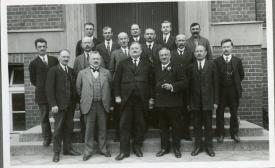
Benjamin Unruh (front row, third from left) stands with refugee representatives in Moelln, Germany, circa 1930. Unruh, a displaced Mennonite from the Soviet Union living in Germany and a committed Nazi, negotiated with the Nazi government on behalf of MCC regarding a debt the relief organization owed. (Mennonite Heritage Archives photo)
Mennonite Central Committee has released the findings of its research on the organization’s historical entanglements with German National Socialism (or Nazism) and its legacy before, during and after the Second World War.
In the lead up to the federal election, Mennonite Central Committee (MCC) has released an election guide to help people have conversations with their candidates and communities. The guide is available online now on MCC’s website. “We believe that governments should maintain a just and peaceful social order,” says Bekah Sears, policy analyst and government relations specialist with MCC Canada’s Peace & Justice office.
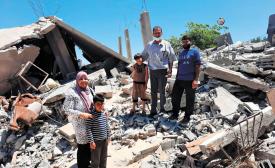
Mohamed Al-Attar, at right in blue, lost his wife, children and his home during the violence in Gaza in May. Rifqa Hamalwai, far left, and Khaled Abu Sharek, centre back, staff members from Al Najd, MCC’s local partner, visited Mohamed and his nephews, Yaser Dia Al Attar, bottom left, and Ali Tamim Al Attar, back left. All local COVID-19 protocols were followed in this photo. (Photo courtesy of Al Najd)
Nighttime was the hardest for Mahmoud Alhalimi. With the electricity cut and bombs falling, the hours were dark and loud, as he tried in vain to help his two young children fall asleep.
There was no peace in Anju Shaw’s life.
For 20 years, she endured constant abuse and neglect at the hands of her husband and then her husband’s parents. She had no support, no one to speak for her or listen to her. She didn’t think the police would care about her—if they believed her at all. The ideas of peace, safety or stability were as far from her as the sky itself.
The newest Mennonite Central Committee (MCC) resource kit will support vulnerable women and girls with dignity. The new dignity kit contains hygiene and sanitary items tailored for women and girls who don’t have ready access to the items they need, including eco-friendly, washable menstrual pads and liners.

(Image by Pexels/Pixabay)
My wife and I live in a triplex in the Montréal borough of Hochelaga, in the eastern part of the island. One of our sons, who does not live with us, usually leaves his bicycle, as well as his son’s smaller one, locked to our front porch when they visit us.
Eight of Alice Joubanian’s grandchildren—all under eight years old—lived with her and her daughter in a Beirut camp for Armenian refugees when a massive explosion of ammonium nitrate rocked the city on Aug. 4, 2020.

High-profile Nazi officials toured the Mennonite colonies in occupied Ukraine. During his 1942 visit to Molotschna, Heinrich Himmler, head of the SS and an architect of the Holocaust, exchanged greetings with Mennonite surgeon Johann Klassen. (Mennonite Heritage Centre photo [Alber Photo Collection])
Mennonite Central Committee (MCC) has initiated research into how national socialism (Nazism) shaped the contexts in Europe and Paraguay where MCC operated in the 1930s and ’40s, and how, at the time, MCC engaged with the German National Socialist government and worked to resettle Mennonite refugees from the Soviet Union.

In response to Hurricane Eta, MCC staff member James Helmuth, left, and volunteer Edgar Hernandez load vehicles with relief kits that will be delivered to the Q’eqchi’ Mennonite Church in the Alta Verapaz region of Guatemala. The church will distribute the kits, which contain towels, hygiene and laundry supplies, to people affected by flooding. (MCC photo by Jardely Martínez)
After two hurricanes in two weeks flooded several countries in Central America twice, Mennonite Central Committee (MCC) is providing emergency food and supplies and making longer-term plans to help with recovery.
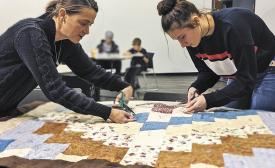
Nadine Ens and her daughter Jenice tie knots in a comforter at the Great Winter Warm-up in Saskatoon on Jan. 18, to kick off MCC’s centennial. MCC is using a webinar series and new podcasts to share stories about its work in Canada and around the world. (MCC photo by Myriam Ullah)
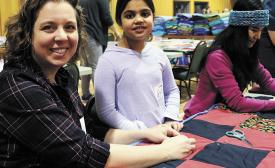
Corinne Narine, left, her daughter Jaden Narine, and Ting Terrazas, all of Winnipeg, are tying their first comforter of the day at the Great Winter Warm-up, a comforter-tying event that was held across Canada, the United States and Europe to kick off MCC’s centennial on Jan. 18. In total, MCC received 9,504 comforters, exceeding the goal of 6,500. (MCC photo by Emily-Ann Doerksen)
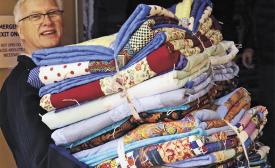
Volunteer Gord Friesen helps load 210 completed comforters into a truck at the end of the Great Winter Warm-up event at North Kildonan Mennonite Brethren Church in Winnipeg, on Jan 18. An MCC webinar episode, called ‘From hearts to hands: Material resources,’ describes meaningful volunteer opportunities for people to make and pack comforters and relief kits. (MCC photo by Emily-Ann Doerksen)
“One bar of soap isn’t just a drop in the ocean of need. The ripples keep moving out in ways we may not even be able to count.”
“What would it take to stay open?” asked members of the Edmonton Ten Thousand Villages (TTV) Society after the organization announced its closure in early January. Independently owned stores across Canada held emergency meetings to decide what to do next.
Mennonite Central Committee is responding to the explosion in Beirut, Lebanon, that caused extensive damage throughout the capital city on Aug. 4.
The blast is believed to have been caused by large quantities of ammonium nitrate, used for fertilizer and explosives, stored unsafely in a warehouse at the city’s port.
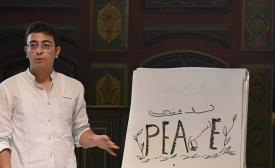
A presenter with Peace Organization, a Syrian non-profit organization, stands during a peace dialogue in Damascus, Syria. (Their name is withheld for security reasons.) At these sessions, held last fall, youth discussed the definition of peace, the role of young people in building peace, and how to start a peace initiative. (Photo courtesy of Peace Organization)
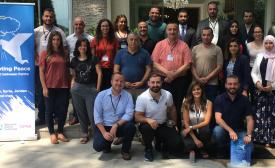
Representatives from 17 Middle Eastern non-profit organizations participated in an August 2019 conference in Broumana, Lebanon, hosted by MCC and its partner organization, Development for People and Nature Association. The conference kicked off a European Union-funded initiative intended to empower the organizations to promote peace. (MCC photo by Garry Mayhew)
With a 994,000-euro grant (C$1.5 million) from the European Union, Mennonite Central Committee (MCC) is empowering organizations to implement peacebuilding projects across four Middle Eastern countries.

The shortest route from Wopisa-Gabriyèl to get medical assistance requires descending this waterfall. (MCC photo by Ted Oswald, 2017)
If you’ve ever invited me to go camping with you, you’ll know I’m not exactly what you would call “outdoorsy.” I enjoy nature, but I don’t really see the need to sleep in it, much less in a stuffy tent with sticks and rocks poking into my back. I feel the same about hiking—I’m just fundamentally unable to understand the appeal of walking for hours through the woods, tripping on rocks and being pestered by insects, just to turn around and walk back again, having accomplished nothing but getting myself exhausted and sweaty?